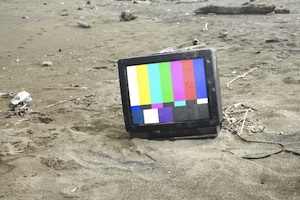Every week we round up industry news you may have missed while you were busy win-winning.
- Enjoying the Olympics? Maybe, but people would enjoy it more if they could watch it live, says Heidi Moore, who’s been one of the most outspoken critics of NBC’s time-delayed coverage. She asks, “In a media industry dying from lack of profits and inattention, is the ideal solution to force viewers back into the past?”:
It is absolutely extraordinary that smart viewers are frustrated with NBC’s coverage and flaunting their use of proxy services to watch the BBC. It is not piracy – the proxy services are legal, and the BBC has broadcast rights too – but the fact that tech CEOs, journalists and others are sharing tips about how to avoid a major network is a sign that the network is missing a crucial turning point in responding to what audiences want from Olympics coverage.
Things got worse when Twitter suspended the account of reporter Guy Adams, who had also been a vocal critic of NBC’s coverage. Since Twitter has an Olympics partnership with NBC, this act of censorship was especially troubling, says Jeff Jarvis:Twitter is going to have to learn the lesson that newspapers had to learn when they started accepting advertising: that when trust is your asset, you must run your service and your business according to principles of trust. Newspapers built church/state walls to demonstrate that they could not be bought by sponsors’ influence. Twitter needs that wall. Every tech company fancying itself a platform does. Or it can’t be trusted and won’t be used and will lose value. Those are the economics of trust.
All of this points to some sort of lesson about how social media has transformed the way people consume, and interact with, major global events like the Olympics, but rather than make that statement here, please refer to this Storify of people saying “Hi” to the U.S. women’s gymnastics team. - The National Association of Hispanic Journalists, however, remains immune to the scourge of social media after ejecting a student reporter for live-tweeting from an open board meeting.
- Lockhart Steele – owner of Curbed and Eater.com – explains how his national hyperlocal network has been able to make money (unlike AOL’s Patch): Â
“It’s a little counterintuitive. We’re a local company that’s not really interested in local advertising,” says Steele, explaining that the sites’ primary sponsors are national brands with big ad budgets like Ben & Jerry’s or Absolut Vodka.
Steele says big brands use Curbed to tap into local communities of shoppers, foodies or home buyers in different regions. He cites a recent example in which Curbed threw a party in Portland on behalf of Patron Tequila. “We can activate audiences in each of these cities we’re in, and activate a real community.”Steele says there simply isn’t enough money in local advertising – with one exception. “The one place you can sell local is real estate … It’s the only category of hyper-local that’s really flush with money.”
- The value of Google’s cost-per-click has been steadily declining since late 2011. What does that mean for the rest of the online ad industry?
Even at the company that managed to make money off of Internet advertising, those online ads are continually losing value. In the scheme of the Internet, Google’s loss shows an unfortunate reality of online advertising. Unlike the print world, Internet ads lose value over time.
- Craigslist now claims it is the “exclusive licensee” of the content in its users’ postings.
- Add McClatchy to the list of paywall adopters.
- “Great long-form journalism comes from the author’s irrepressible need to answer a question. Fictional long-form journalism comes from the writer’s irrepressible need to be hailed as an oracle,” writes Ta-Nehisi Coates in response to the recently-revealed fabrications of Jonah Lehrer. “In the former fabulism isn’t just wrong because it cheats the reader, it’s wrong because it cheats the writer. Manufactured evidence tends not to satiate an aching curiosity. But it does wonders for those most interested in oraculism.”Â
- The Center for Investigative Reporting has launched an investigative news channel on YouTube called, “The I Files.”
- This year the U.S. will surpass Asia as the largest market for mobile advertising, projects eMarketer.
- The fall and rise of mobile-local advertising.
- Seven mobile ad networks for local publishers.
- Three reasons intent based ads are the next big thing.
- 50 percent of consumers say they would trade location privacy for discounts.
- And finally, “My Career Ended While I Was in the Bathroom,” a symbolic tale by David Sheets, who was laid off by the St. Louis Post-Dispatch last week.

